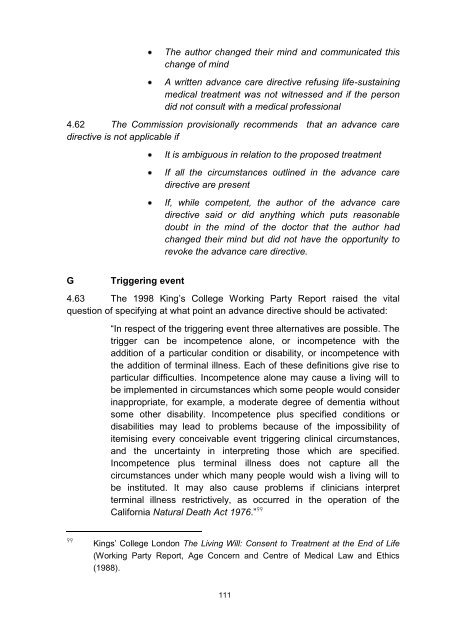Consultation Paper on Bioethics - Law Reform Commission
Consultation Paper on Bioethics - Law Reform Commission
Consultation Paper on Bioethics - Law Reform Commission
Create successful ePaper yourself
Turn your PDF publications into a flip-book with our unique Google optimized e-Paper software.
The author changed their mind and communicated this<br />
change of mind<br />
A written advance care directive refusing life-sustaining<br />
medical treatment was not witnessed and if the pers<strong>on</strong><br />
did not c<strong>on</strong>sult with a medical professi<strong>on</strong>al<br />
4.62 The Commissi<strong>on</strong> provisi<strong>on</strong>ally recommends that an advance care<br />
directive is not applicable if<br />
G Triggering event<br />
It is ambiguous in relati<strong>on</strong> to the proposed treatment<br />
If all the circumstances outlined in the advance care<br />
directive are present<br />
If, while competent, the author of the advance care<br />
directive said or did anything which puts reas<strong>on</strong>able<br />
doubt in the mind of the doctor that the author had<br />
changed their mind but did not have the opportunity to<br />
revoke the advance care directive.<br />
4.63 The 1998 King‟s College Working Party Report raised the vital<br />
questi<strong>on</strong> of specifying at what point an advance directive should be activated:<br />
“In respect of the triggering event three alternatives are possible. The<br />
trigger can be incompetence al<strong>on</strong>e, or incompetence with the<br />
additi<strong>on</strong> of a particular c<strong>on</strong>diti<strong>on</strong> or disability, or incompetence with<br />
the additi<strong>on</strong> of terminal illness. Each of these definiti<strong>on</strong>s give rise to<br />
particular difficulties. Incompetence al<strong>on</strong>e may cause a living will to<br />
be implemented in circumstances which some people would c<strong>on</strong>sider<br />
inappropriate, for example, a moderate degree of dementia without<br />
some other disability. Incompetence plus specified c<strong>on</strong>diti<strong>on</strong>s or<br />
disabilities may lead to problems because of the impossibility of<br />
itemising every c<strong>on</strong>ceivable event triggering clinical circumstances,<br />
and the uncertainty in interpreting those which are specified.<br />
Incompetence plus terminal illness does not capture all the<br />
circumstances under which many people would wish a living will to<br />
be instituted. It may also cause problems if clinicians interpret<br />
terminal illness restrictively, as occurred in the operati<strong>on</strong> of the<br />
California Natural Death Act 1976.” 99<br />
99 Kings‟ College L<strong>on</strong>d<strong>on</strong> The Living Will: C<strong>on</strong>sent to Treatment at the End of Life<br />
(Working Party Report, Age C<strong>on</strong>cern and Centre of Medical <strong>Law</strong> and Ethics<br />
(1988).<br />
111

















